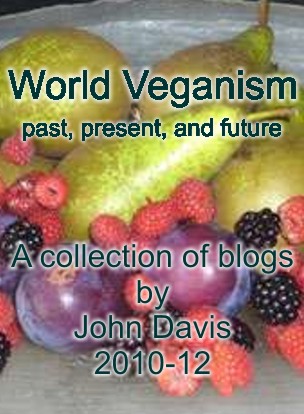April 18, 2012
And other questions... B12 was discovered 1948, the word 'vitamin' having first appeared in the early 20th century. So if 19th century vegans had vitamin deficiencies they had no way of knowing it, and would have diagnosed it as something else.
All we know about most people from the 19th century is what has survived in print. The veg*ns wrote a lot of propaganda about the benefits of their diets, but rarely, if ever, made detailed records of any problems they experienced. Death records were very limited and, by today's standards, also often misdiagnosed.
A useful comment on Wikipedia: "Historically, it's been easy to get B12, because until recently we didn't live in a sanitized environment. Plants pulled from the ground and not washed scrupulously may contain remnants of B12 acquired from the bacteria present in the surrounding soil. B12 is also found in lakes, before the water is sanitized."
I've seen that view elsewhere, and it seems reasonable, but I'm not recommending eating unwashed vegetables or drinking dirty water! Those trying to follow a totally plant-food diet today should, of course, ensure an adequate source of B12, either through supplements or fortified foods.
The numbers of 'vegans' in the 19th century was probably very small, but if they were suffering from B12 deficiency they should have had enough contact with each other to at least realise they were getting similar symptoms, and we have no record of that.
The other likely reason we have no deficiency reports was just a lack of consistency in their diet. Many people today support the idea of veganism but, for whatever reason, are not very perfectionist about it, and it doesn't take much of an occasional animal product to get the very small amount of necessary B12.
But being 'vegan' in the 19th century was much harder than it is today, so a lower level of perfectionist consistency was inevitable, and we can see this in many that we know about. Some examples:
Dr. William Lambe changed to a diet solely plant-foods and distilled water in 1806, when he was 40. He lived to be 82 and was reported as being in very good health near the end. However, after he died his daughter told his biographer that the women, and presumably servants, in the family, could never manage to make cakes and pastries without any animal products. As Lambe knew nothing about cookery they just put in as little as possible and told him there was none. Whether he guessed this we'll never know, but it might have been enough for the very small amounts of B12 that were needed.
Percy Bysshe Shelley joined Lambe's circle of friends in 1812, and in the spring of 1813 spent a few months living in a 'commune' that was trying very hard to be completely vegan. They had the same struggle with some foods - margarine was not invented until decades later, and soy products were unknown - but they seem to have been determined to do the best they could. After a few months Shelley moved on and the records are not sufficiently detailed for us to know how long he kept to his 'vegan' diet, though given the endless difficulties it was probably not long. The body can store B12 for a long time, and just a few months without it are unlikely to cause long term damage.
Over in the USA Bronson Alcott also spent maybe a couple of years as what we would now call a strict abolitionist vegan in the 1840s. He probably never gave up on his ideal, but the endless social pressures would have made it extremely difficult to maintain after his attempted commune failed.
His friend Henry David Thoreau also tried to give up all animal foods, but never quite managed to drop the fish, saying he felt guilty about eating it.
William Horsell, who did more than anyone to promote 'veganism' in London in the 1840s and 50s, eventually died in West Africa in 1862. He was buried in Lagos, Nigeria. It's hard to imagine him maintaining a perfect diet on that trip.
We can see similar patterns in all of our 19th century 'vegans' - some managed to keep close to their diet over a long time, but only rather inconsistently, others were deeply committed for a short period, but then drifted back to including some animal products.
So if we try to find a 'perfect vegan' in the 19th century, we will be searching in vain. Their historical value is not in what they were able to do - it is about where they were trying to go. They knew what they wanted, but struggled to maintain any degree of long term consistency in getting there.
This is in stark contrast to those whose vision was a promised land "flowing with milk and honey" (and eggs), and saw that as an essential part of their diet.
Of course we see exactly the same in many people who support the idea of veganism today. When I attend vegan events I often talk to people, quietly and privately, about how consistent they are in their veganism. My impression has been that a high proportion of them are not entirely consistent, not through any lack of shared ideals, but because of all the difficulties, and relentless social pressures.
The 19th century wannabe 'vegans' demonstrated that individual perfectionism is not the priority in the course of history. There are many routes to veganism and many people at different places along the route. Most of us today manage much better than they could in the 19th century, and future generations will do better again.
So if we want a vegan future it is not so important how perfect any individual manages to be. What matters is agreement about the ideal of a vegan world - where we are collectively trying to go is more important than where any of one of us is right now.
Some final notes:
Vegan nutritionists recommend that vegans either consistently eat foods fortified with B12 or take a B12 supplement. Vitamin B12 deficiency can potentially cause severe and irreversible damage, especially to the brain and nervous system.
 John Davis
John Davis
